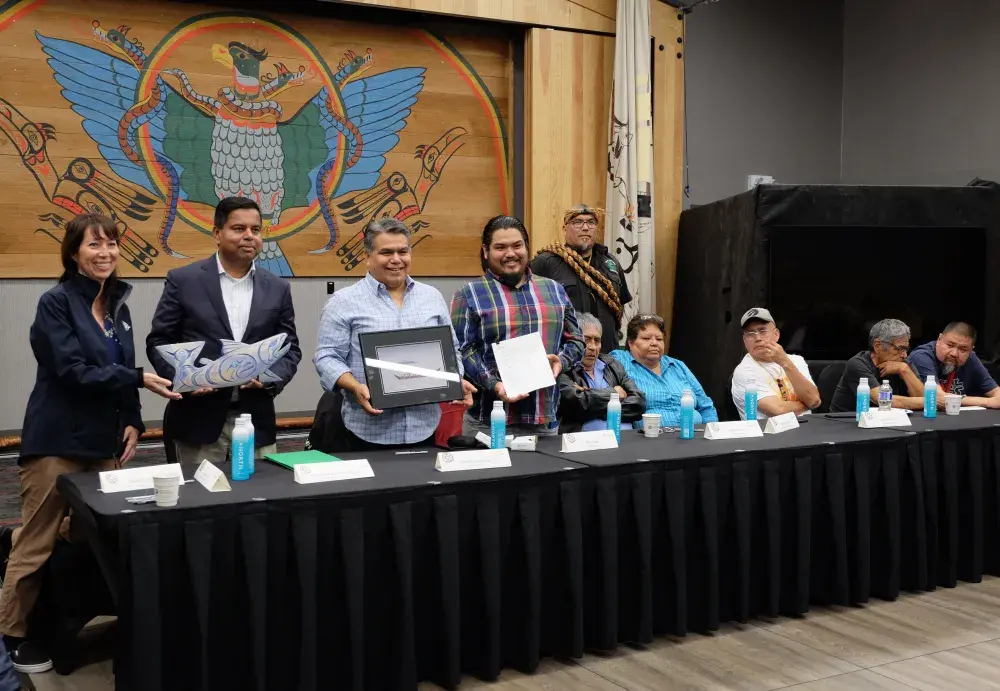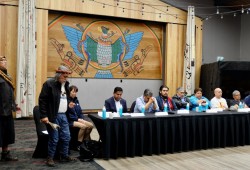On June 27, at Tin Wis Resort and the former site of the Christie Residential School, Tla-o-qui-aht (ƛaʔuukwiʔatḥ) First Nations signed a hopeful agreement with the Government of Canada.
The paperwork — Hisiikcumyin Memorandum of Understanding (MOU) — sets out a framework for continuing reconciliation negotiations between ƛaʔuukwiʔatḥ and Canada. It was signed by the Gary Anandasangaree, minister of Crown-Indigenous Relations, ƛaʔuukwiʔatḥ Chief Councillor Elmer Frank and the ƛaʔuukwiʔatḥ haw̓iih (Hereditary Chiefs). According to the Government of Canada, the MOU “outlines collaborative efforts and a path forward to address community priorities and advance reconciliation, and continue shared stewardship of Pacific Rim National Park Reserve.”
Chief Councillor Frank addressed the intimate crowd during the June 27 signing ceremony in Tofino.
“When we talk about a pathway agreement, we’re creating an agreement that will be based on what our needs our, to start showing people what we need to do to demonstrate that we have the ability to become self-governing at some point,” said Frank. “The Indian Act system is just not working for us as First Nations People.”
He added that he was 11-years-old when his family members protected the Old Growth trees at Heelboom Bay, or Cis-a-qis, on Meares Island.
“We’ve had the notion as First Nations People to continue to maintain conservation and maintain conservancies in our traditional territory,” Frank continued. “One of the things that our elders and our past leaders tell us is we need to find a way to start to benefit from what our ancestors did with the forest. We’re hopeful that this pathway agreement will allow us to do that.”
“One of our past chief councillors Moses Martin said, ‘Why is there a need for us to fight? Why is there a need for us to fight no matter what we do as First Nations people? We always seem to have to fight or go to court,” Frank added. “We should be beyond that.”
Minister Anandasangaree said the Hisiikcumyin MOU is an affirmation that Canada wants to do the right thing.
“We’ve had a number of MOUs in the past, you know the history,” Anandasangaree told the Ha-Shilth-Sa. “I think this is a trust-building exercise. This is for us to demonstrate that we want to advance work together; Parks Canada being a critical component of this.”
One priority outlined in the MOU is to “explore the potential application of tribal park management, shared management, and stewardship models” in areas of the Pacific Rim National Park Reserve that fall within ƛaʔuukwiʔatḥ territory. Other priorities stated in the MOU include: language preservation and revitalization, housing and infrastructure, economic development, recognizing and implementing ƛaʔuukwiʔatḥ governance and law, while addressing interests associated with “Parcel 2”.
In 2003, ƛaʔuukwiʔatḥ entered an MOU with Canada to facilitate the transfer of “Parcel 1” and “Parcel 2” lands from the Pacific Rim National Park Reserve. While objectives related to “Parcel 1” were fulfilled by adding it to Esowista and creating the community of Ty-Histanis, the transfer of “Parcel 2” lands have not been fulfilled, reads the 2024 MOU.
haw̓iiḥtaqumł (House of Wickaninnish) said she has witnessed many agreements in her life. She spoke about ensuring prosperity and recognition for ƛaʔuukwiʔatḥ haw̓iih hahuułi (ha-houlth-ee).
“When I stand here, I don’t want say, ‘Oh that agreement, another fail’,” said haw̓iiḥtaqumł. “We shouldn’t have to beg for our rights and title to be recognized. We’re tired. We want recognition for our haw̓iih. Our governance. We’re tired of not being part of the landscape.”
“Our haw̓iih have managed our lands and resources without over harvesting or over fishing for years,” she went on to say.
Chief Frank pointed out that “they haven’t even scratched the surface” when it comes to negotiations for fishing rights. The MOU acknowledges that ƛaʔuukwiʔatḥ is already involved in multi-specie fisheries-related matters. This includes the Five Nations (Ahousaht, ƛaʔuukwiʔatḥ, Mowachaht/Muchalaht, Hesquiaht, and Ehattesaht First Nations) Recognition of Indigenous Rights and Self-Determination (RIRSD) negotiations table, and therefore does not include fisheries in the MOU.
Anandasangaree called the signing ceremony a “crossroads”.
“The next few years will be critical for the relationship,” said the minister of Crown-Indigenous Relations. “I’m here today to show you that the next generation will have a future that is far better than ours and the relationship that we had.”
Frank offered a similar view.
“I really feel that we are at a pivotal point where our younger generations shouldn’t have to fight,” he said.
The MOU asserts that ƛaʔuukwiʔatḥ has unceded Aboriginal title and rights to land, waters and resources in their traditional territory. It is not a legally binding document and is “intended only as an expression of good will.”


